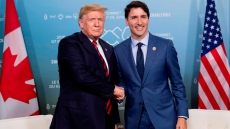OTTAWA - Suddenly, the Liberal government is all about Africa, and there is a very practical political reason for that — avoiding an embarrassing defeat in a major upcoming international election.
When Prime Minister Justin Trudeau arrives in Ethiopia later this week, he will be following in the footsteps of two cabinet ministers and a parliamentary secretary who have visited in the last few weeks. The attention is all part of Canada's campaign for a seat on the United Nations Security Council.
Many analysts say Trudeau's Africa tour may be too little, too late because Canada's spending commitments on foreign aid and personnel contributions to UN peacekeeping are at all-time lows.
His government has been accused of largely ignoring Africa, which is a key UN voting bloc, but now suddenly the Liberals are discovering the political value of the fast-growing continent.
Africa, with its 54 voting countries, is a kingmaker of sorts in the secret ballot at the UN General Assembly's 190-plus countries where Canada will need at least 128 votes in the upcoming June election for a two-year term starting in 2021. Canada faces tough competition from Norway and Ireland, which both spend more on foreign aid and peacekeeping.
Two seats up for grabs in what is called the "Western European and Others Group" of the UN. It's a bloc that usually circles the wagons in favour of its own European members at the expense of the "others" in the group — namely Canada, Australia and Israel.
"Without support on the African continent, Canada's bid for the Security Council is a non-starter," said Nicolas Moyer, the president of the Canadian Council for International Co-operation.
Trudeau visits Addis Ababa to meet with Ethiopia's prime minister and president and attend the African Union Summit there before travelling to Dakar to meet with the president of Senegal.
Trudeau committed Canada to a Security Council run in 2015 as part of his "Canada is back" pledge, following the 2010 loss of a seat to smaller and economically fragile Portugal under the previous Conservative government.
Moyer and many others have long called on Canada to make a commitment to reach the UN goal for development spending of 0.7 per cent of gross national income. Canada's current level is less than 0.3 per cent, which has it near the bottom of the pack among of the roughly three-dozen richest countries in the world. Norway's development spending rate is almost at one full per cent, while Ireland has laid out a plan to reach the 0.7 target.
"On that measure we don't compare very well to our competitors."
Canada's 2010 loss to Portugal was largely due to the inability of the then Stephen Harper Conservative government to persuade African countries to offer support, said Adam Chapnick, the Royal Military College professor and author of the new book "Canada on the United Nations Security Council: A Small Power on a Large Stage."
"The votes we needed that we didn't get were largely in Africa. In the previous campaigns, we'd virtually swept Africa and that made up for the fact that we rarely have much success in Eastern Europe. And Europe itself can be challenging because our opponents are usually Europeans."
Canada is better positioned in Africa than most might think, in part because too much is being made of Canada's low spending on rate based on gross national income, said Chapnick.
"Africa doesn't vote as a bloc," said Chapnick, whose book examines the intricacies of Canada's past Security Council bids. "Every country votes in large part, based on what the nominees have done for them personally, lately. And the total number of dollars we spend on aid to Africa is not nearly as proportionately low as the percentage of our GNI."
On a recent conference call at the end of his Africa trip, Foreign Affairs Minister Francois-Philippe Champagne noted that Canada had given the West African country of Mali $1.6 billion in development assistance over the last decade.
Canada also has an advantage over Ireland in West African countries because it is French speaking, said Chapnick. That's something Trudeau is likely to emphasize when he arrives in Senegal next week.
"The personal touch in Africa does matter quite a bit. The appearance of a G7 leader . . . brings credibility to your state and demonstrates the importance of your state on the world stage, and that can be quite helpful," said Chapnick.
But Leona Alleslev, the deputy leader of the Conservatives, said numbers matter more, and Canada's will be hurt by the recent withdrawal of peacekeepers from Mali and the fact the Trudeau government has no clear plan to redeploy elsewhere in Africa.
"They don't have a strategy and now they're grasping at straws. So, what is it that they are offering when they have withdrawn from the Mali peacekeeping mission, when they haven't looked at any other peacekeeping missions?" she said.
Unlike some fellow Conservatives — including former prime minister Stephen Harper who once branded the UN a club for dictators — Alleslev said Canada needs a seat on the Security Council to better represent the interests of middle powers, and to build international credibility with important trading partners.
Alleslev noted the latest figures tabled in the House of Commons showed the government spent almost $2 million on the bid as of early December, up from the $1.5 million of the previous spring.
"I think it's too little, too late because they don't know what they're trying to sell."

